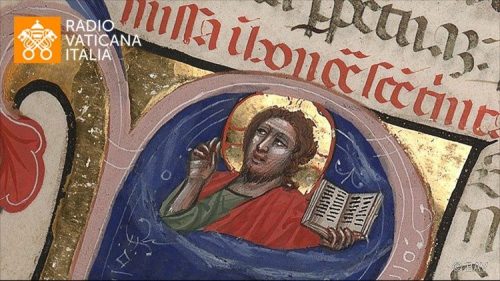READING OF THE DAY
READING 1
IS 53:10-11
The LORD was pleased
to crush him in infirmity.If he gives his life as an offering for sin,
he shall see his descendants in a long life,
and the will of the LORD shall be accomplished through him.Because of his affliction
he shall see the light in fullness
of days;
through his suffering, my servant shall justify many,
and their guilt he shall bear.READING 2
HEB 4:14-16
Brothers and sisters:
Since we have a great high priest who has passed through the heavens,
Jesus, the Son of God,
let us hold fast to our confession.
For we do not have a high priest
who is unable to sympathize with our weaknesses,
but one who has similarly been tested in every way,
yet without sin.
So let us confidently approach the throne of grace
to receive mercy and to find grace for timely help.
GOSPEL OF THE DAY
MK 10:35-45
James and John, the sons of Zebedee, came to Jesus and said to him,
“Teacher, we want you to do for us whatever we ask of you.”
He replied, “What do you wish me to do for you?”
They answered him, “Grant that in your glory
we may sit one at your right and the other at your left.”
Jesus said to them, “You do not know what you are asking.
Can you drink the cup that I drink
or be baptized with the baptism with which I am baptized?”
They said to him, “We can.”
Jesus said to them, “The cup that I drink, you will drink,
and with the baptism with which I am baptized, you will be baptized;
but to sit at my right or at my left is not mine to give
but is for those for whom it has been prepared.”
When the ten heard this, they became indignant at James and John.
Jesus summoned them and said to them,
“You know that those who are recognized as rulers over the Gentiles
lord it over them,
and their great ones make their authority over them felt.
But it shall not be so among you.
Rather, whoever wishes to be great among you will be your servant;
whoever wishes to be first among you will be the slave of all.
For the Son of Man did not come to be served
but to serve and to give his life as a ransom for many.”
WORDS OF THE HOLY FATHER
Today’s biblical readings present the theme of service. They call us to follow Jesus on the path of humility and the cross.
The prophet Isaiah depicts the Servant of the Lord (53:10-11) and his mission of salvation. The Servant is not someone of illustrious lineage; he is despised, shunned by all, a man of sorrows. He does not do great things or make memorable speeches; instead, he fulfils God’s plan through his humble, quiet presence and his suffering. His mission is carried out in suffering, and this enables him to understand those who suffer, to shoulder the guilt of others and to make atonement for it. The abandonment and sufferings of the Servant of the Lord, even unto death, prove so fruitful that they bring redemption and salvation to many.
Jesus is the Servant of the Lord. His life and death, marked by an attitude of utter service (cf. Phil 2:7), were the cause of our salvation and the reconciliation of mankind with God. The kerygma, the heart of the Gospel, testifies that his death and resurrection fulfilled the prophecies of the Servant of the Lord. Saint Mark tells us how Jesus confronted the disciples James and John. Urged on by their mother, they wanted to sit at his right and left in God’s Kingdom (cf. Mk 10:37), claiming places of honour in accordance with their own hierarchical vision of the Kingdom. Their horizon was still clouded by illusions of earthly fulfilment. Jesus then gives a first “jolt” to their notions by speaking of his own earthly journey: “The cup that I drink you will drink… but to sit at my right hand or at my left is not mine to grant, but it is for those for whom it has been prepared” (vv. 39-40). With the image of the cup, he assures the two that they can fully partake of his destiny of suffering, without, however, promising their sought-after places of honour. His response is to invite them to follow him along the path of love and service, and to reject the worldly temptation of seeking the first place and commanding others.
Faced with people who seek power and success in order to be noticed, who want their achievements and efforts to be acknowledged, the disciples are called to do the opposite. Jesus warns them: “You know that among the Gentiles those whom they recognize as their rulers lord it over them, and their great ones are tyrants over them. But it is not so among you; but whoever wishes to become great among you must be your servant” (vv. 42-44). These words show us that service is the way for authority to be exercised in the Christian community. Those who serve others and lack real prestige exercise genuine authority in the Church. Jesus calls us to see things differently, to pass from the thirst for power to the joy of quiet service, to suppress our instinctive desire to exercise power over others, and instead to exercise the virtue of humility.
After proposing a model not to imitate, Jesus then offers himself as the ideal to be followed. By imitating the Master, the community gains a new outlook on life: “The Son of Man came not to be served but to serve, and to give his life as a ransom for many” (v. 45). In the biblical tradition, the Son of Man is the one who receives from God “dominion, glory and kingship” (Dan 7:14). Jesus fills this image with new meaning. He shows us that he enjoys dominion because he is a servant, glory because he is capable of abasement, kingship because he is fully prepared to lay down his life. By his passion and death, he takes the lowest place, attains the heights of grandeur in service, and bestows this upon his Church.
There can be no compatibility between a worldly understanding of power and the humble service which must characterize authority according to Jesus’ teaching and example. Ambition and careerism are incompatible with Christian discipleship; honour, success, fame and worldly triumphs are incompatible with the logic of Christ crucified. Instead, compatibility exists between Jesus, “the man of sorrows”, and our suffering. The Letter to the Hebrews makes this clear by presenting Jesus as the high priest who completely shares our human condition, with the exception of sin: “We do not have a high priest who is unable to sympathize with our weaknesses, but we have one who in every respect has been tested as we are, yet without sin” (4:15). Jesus exercises a true priesthood of mercy and compassion. He knows our difficulties at first hand, he knows from within our human condition; the fact that he is without sin does not prevent him from understanding sinners. His glory is not that born of ambition or the thirst for power; it is is the glory of one who loves men and women, who accepts them and shares in their weakness, who offers them the grace which heals and restores, and accompanies them with infinite tenderness amid their tribulations.
Each of us, through baptism, share in our own way in Christ’s priesthood: the lay faithful in the common priesthood, priests in the ministerial priesthood. Consequently, all of us can receive the charity which flows from his open heart, for ourselves but also for others, and become “channels” of his love and compassion, especially for those who are suffering, discouraged and alone.
(Holy Mass and Canonization, 18 October 2015)

